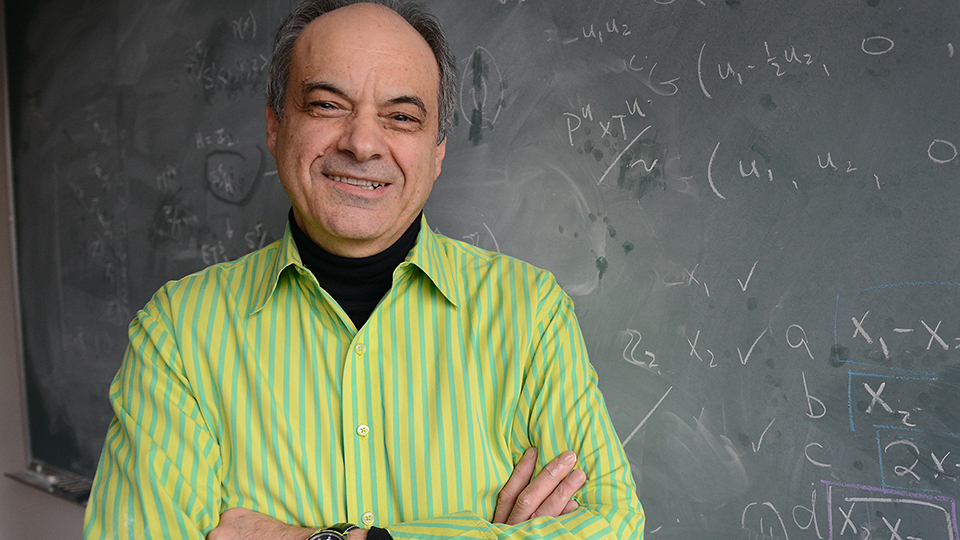Monday, Dec 15, 2014
Tony Bahri's appointment will strengthen ties to research collaborators he has already established at Princeton
by Adam Grybowski
Tony Bahri, a professor in Rider University’s mathematics department who excels at grasping mathematical concepts beyond normal intuition, has been appointed a Visiting Research Scholar in Princeton University's Department of Mathematics.
Bahri, whose appointment begins Jan. 15, 2015, and runs through June 30, 2015, is a pure mathematician, as opposed to an applied mathematician who uses pure mathematics for applied problems. “Contrary to popular belief, mathematics isn't just calculation; it involves ideas, many of which permeate our daily lives," he says.
For the past nine years, Bahri has focused his research on toric topology, a relatively new field that uses algebra and combinatorics to analyze complex shapes. Topologists study the often counterintuitive way that shapes in multiple dimensions can be formed and deformed.
While that may seem abstract, it has large implications for some of the most important questions occupying the minds of scientists and mathematicians. For example, it is topology that helps string theorists speculate on the shape of the universe, which scientists believe exists in as many as 10 dimensions. The movement of robotic arms is also governed by the geometry of large dimensional shapes.
“Mathematics is a type of tool," Bahri says. “It's like a telescope or a microscope that enables us to see and understand phenomena in inaccessible places. Mathematics allows us to extend our reach over the infinite."
Bahri's appointment will strengthen the ties to research collaborators he has already established at Princeton, where he currently co-organizes a weekly seminar that attracts speakers internationally. In 2012, Bahri also organized a joint Princeton-Rider workshop on homotopy theory and toric spaces — the first such joint meeting of its kind, he says.
Bahri, who has taught at Rider since 1983, thought of becoming a chemical engineer or a physicist before he realized that mathematics was the essence of both — and so many other —fields. “A student with a solid understanding of mathematics is well positioned to study any of the sciences and to pursue an astonishing number of fields," he says.
In the classroom, Bahri believes in laying a strong foundation of mathematical understanding to help his students grasp the upper reaches of the subject. He compares it to ensuring that students know all 26 letters of the alphabet before they begin reading Shakespeare. “I try not to allow my students to have fuzzy ideas, and many of them appreciate it because what I teach becomes more understandable," he says. “When we cut too many corners in an effort to make mathematics more accessible, things stop making sense in a hurry."
The nature of research in mathematics is generally not well understood among non-mathematicians, Bahri says. “It’s a very beautiful subject, but it's obscured by a language barrier. Reading a particularly appealing piece of mathematics can be like trying to read a poem in a language with which you are not familiar.”
“Advanced mathematics permeates all aspects of life these days, including everything from smartphones to Wall Street," he continues. "It's a wonderful tool made for people who have a sense of wonder. It allows us to indulge ourselves in a fuller appreciation of beauty."
Bahri speaks with pride about Riders accomplished mathematics department, which includes two former members of the Institute for Advanced Study in Princeton, Dr. Andy Markoe (1970-71) and Dr. Ciprian Borcea (1990-91.) Dr. Jason McCullough was recently a member of the prestigious Mathematical Sciences Research Institute in Berkeley.
“We are all devoted to teaching, and we want our students to be exposed to the power and the beauty of mathematics," Bahri says. "When you go to a museum, the beauty of a painting is immediate, but in a delicate or crafty piece of mathematics, the beauty isn't readily accessible. However, that doesn't mean it does not exist."
The University's mathematics department makes a “big noise" for its size, Bahri says. Rider has twice hosted two sectional meetings of the American Mathematical Society, and they were two of the society's largest meetings ever outside of its annual meeting, Bahri says, adding that mathematicians came from 15 countries and 35 states. “The research level here is very high and distinguishes Rider in the field," he says. “Rider is truly exceptional because of the availability of research funding and the way in which research is valued."
During his appointment at Princeton, Bahri will visit the Ennio De Giorgi Mathematical Research Center in Pisa, Italy, for a month-long series of seminars. Then, in March, he will co-organize a large international conference at Princeton with speakers from many states and several countries, including Britain, Canada, Germany, Russia and Japan. The conference will honor and commemorate two of Bahri's closest collaborators.
His appointment as a Visiting Research Scholar does not include teaching responsibilities, freeing him to focus on his research — a boon, Bahri says, because research is so demanding that it requires one's complete attention. “As in many disciplines, the only way to make progress is to become absorbed completely in what you are doing. Otherwise, you're going to just be skimming the surface.”
On the other hand, the classroom can serve as a reprieve from the frequent frustrations of research. “If something's not working," Bahri says, “you return to the classroom, and when you make something click for a student, things are good again.”

